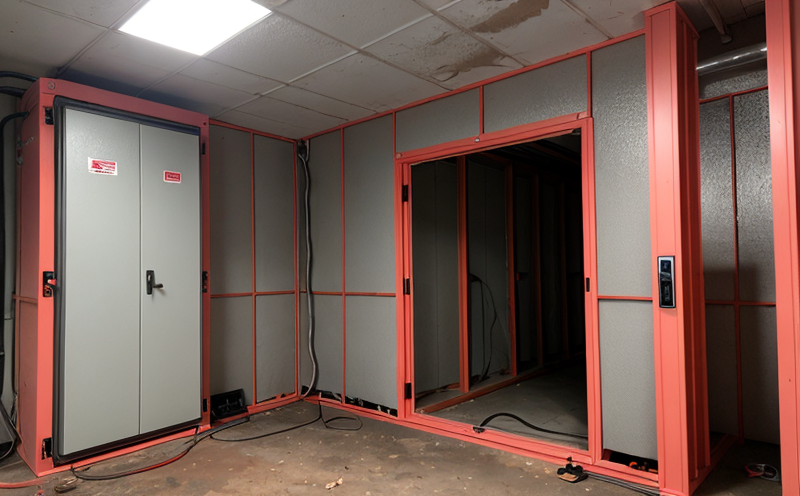Ensuring that the device meets insulation resistance standards for safe operation
Ensuring Safe Operation Why Meeting Insulation Resistance Standards Matters
In todays fast-paced business environment, companies are under constant pressure to optimize performance, reduce costs, and maintain compliance with industry regulations. One critical aspect that often gets overlooked is the electrical safety of equipment and devices used in various settings. Ensuring that a device meets insulation resistance standards for safe operation is not just a best practice; its a necessity that can make all the difference between a compliant and non-compliant business.
At Eurolab, our team of experts understands the importance of insulation resistance testing and is committed to helping businesses like yours ensure their devices meet the required safety standards. In this article, well delve into the world of insulation resistance testing, exploring its significance, benefits, and key considerations.
What is Insulation Resistance Testing?
Insulation resistance testing is a laboratory service that measures the electrical resistance between two conductive surfaces separated by an insulating material. This test is crucial for evaluating the effectiveness of an electrical insulation system, which protects against electric shock, short circuits, and other hazards. By conducting regular insulation resistance tests, businesses can identify potential safety risks and take corrective action to prevent equipment failure, damage, or even accidents.
Why Meeting Insulation Resistance Standards Matters
The importance of meeting insulation resistance standards cannot be overstated. Here are some key reasons why
Prevents Electric Shock Electrical shock is a leading cause of workplace injuries and fatalities. By ensuring devices meet insulation resistance standards, businesses can significantly reduce the risk of electric shock and protect employees from harm.
Reduces Equipment Failure Faulty insulation can lead to equipment failure, resulting in costly downtime, repairs, or even replacement. Regular insulation resistance testing helps prevent these issues, minimizing the financial impact on your business.
Maintains Compliance with Regulations Insulation resistance standards are governed by various industry regulations and codes of practice. Meeting these standards ensures compliance, reducing the risk of fines, penalties, or reputational damage.
Enhances Product Reliability By ensuring devices meet insulation resistance standards, businesses can enhance product reliability, build trust with customers, and maintain a competitive edge in the market.
Key Benefits of Insulation Resistance Testing
Here are some key benefits of using insulation resistance testing services
Early Detection of Faults Regular insulation resistance tests identify potential safety risks early on, allowing businesses to take corrective action before equipment failure or accidents occur.
Cost Savings By preventing equipment failure and reducing downtime, businesses can save time, money, and resources in the long run.
Improved Product Safety Ensuring devices meet insulation resistance standards enhances product safety, protecting employees, customers, and users from electrical hazards.
Enhanced Brand Reputation Meeting insulation resistance standards demonstrates a commitment to quality, safety, and customer trust, contributing to a positive brand reputation.
Common Applications of Insulation Resistance Testing
Insulation resistance testing has various applications across different industries, including
Electrical Equipment Manufacturing Ensuring electrical equipment meets insulation resistance standards is crucial for compliance with industry regulations and product safety.
Industrial Maintenance Regular insulation resistance tests help prevent equipment failure and downtime in industrial settings.
Automotive and Aerospace Meeting insulation resistance standards is essential for ensuring the safe operation of electrical systems in vehicles and aircraft.
Frequently Asked Questions (FAQs)
Here are some frequently asked questions about insulation resistance testing
Q What are the benefits of regular insulation resistance tests?
A Regular insulation resistance tests identify potential safety risks early on, preventing equipment failure, reducing downtime, and enhancing product reliability.
Q How often should insulation resistance tests be performed?
A The frequency of insulation resistance tests depends on factors like equipment usage, environmental conditions, and industry regulations.
Q Can I conduct insulation resistance tests in-house or do I need a professional laboratory service?
A While in-house testing is possible, its recommended to use a professional laboratory service like Eurolab for accurate results and expert analysis.
Conclusion
Ensuring that devices meet insulation resistance standards for safe operation is not just a regulatory requirement; its a business imperative. By investing in insulation resistance testing services from Eurolab, businesses can protect employees, customers, and users from electrical hazards, reduce equipment failure and downtime, and maintain compliance with industry regulations. Dont compromise on safety choose Eurolab for reliable insulation resistance testing services that meet your unique needs and requirements.




